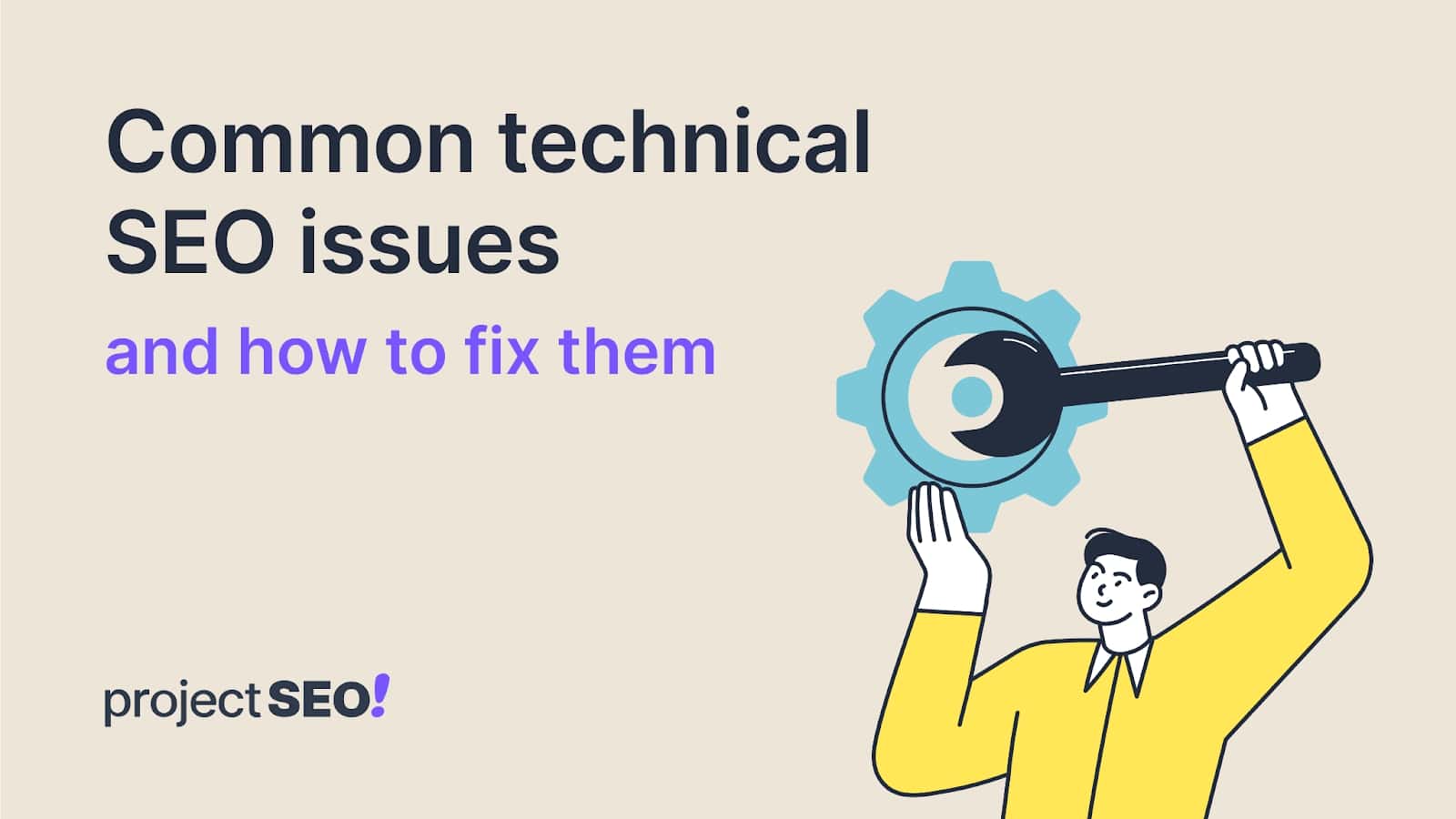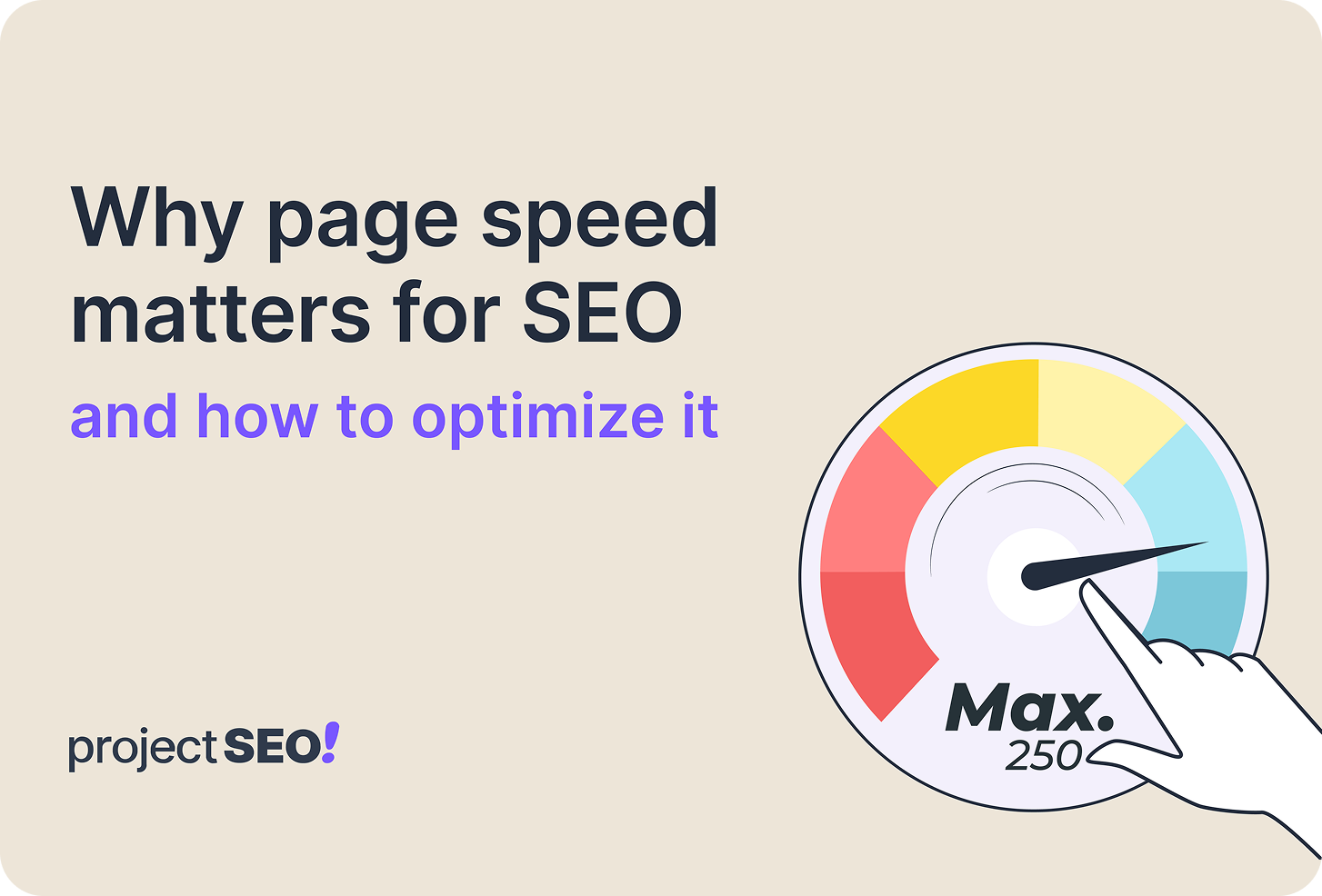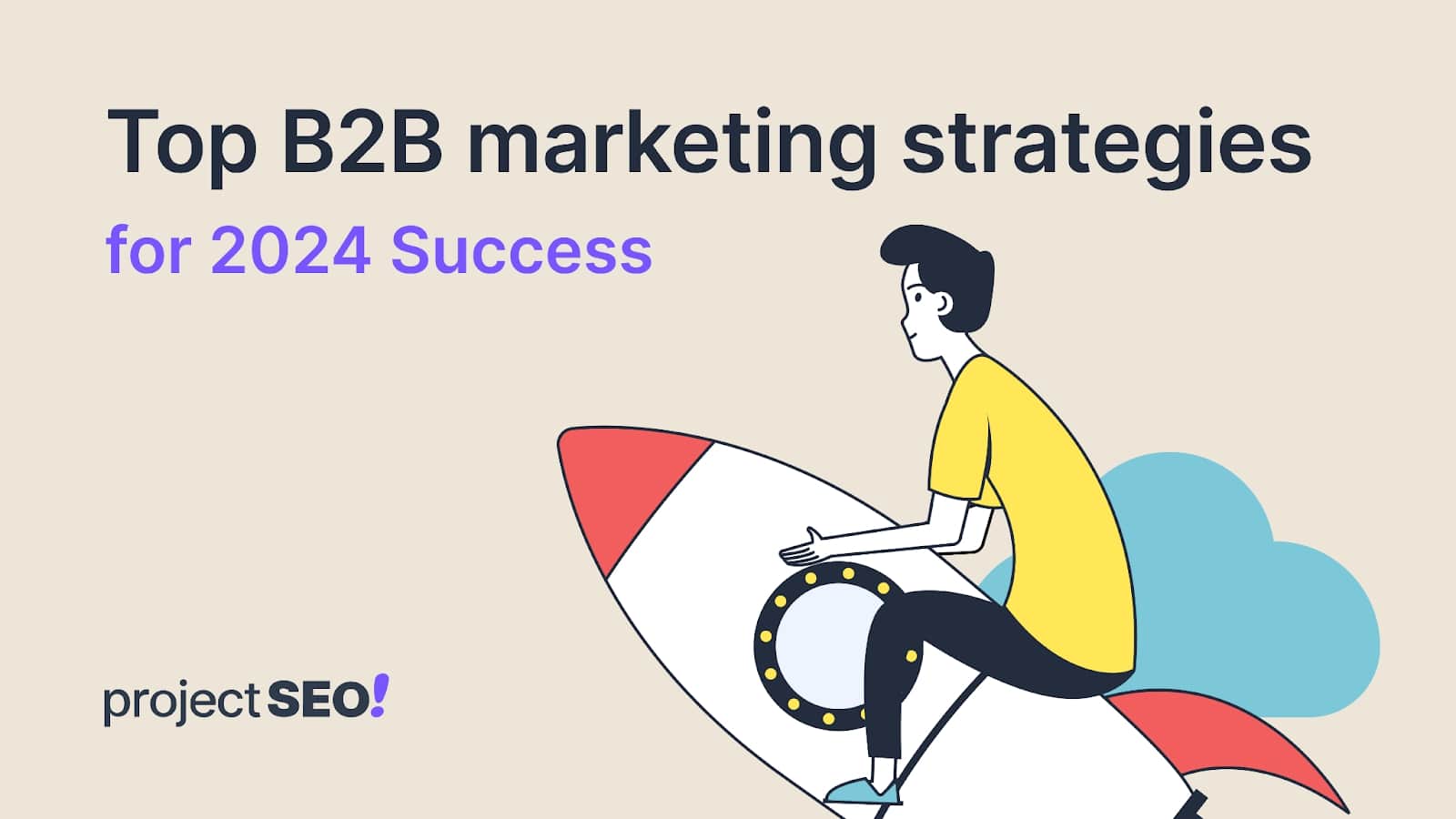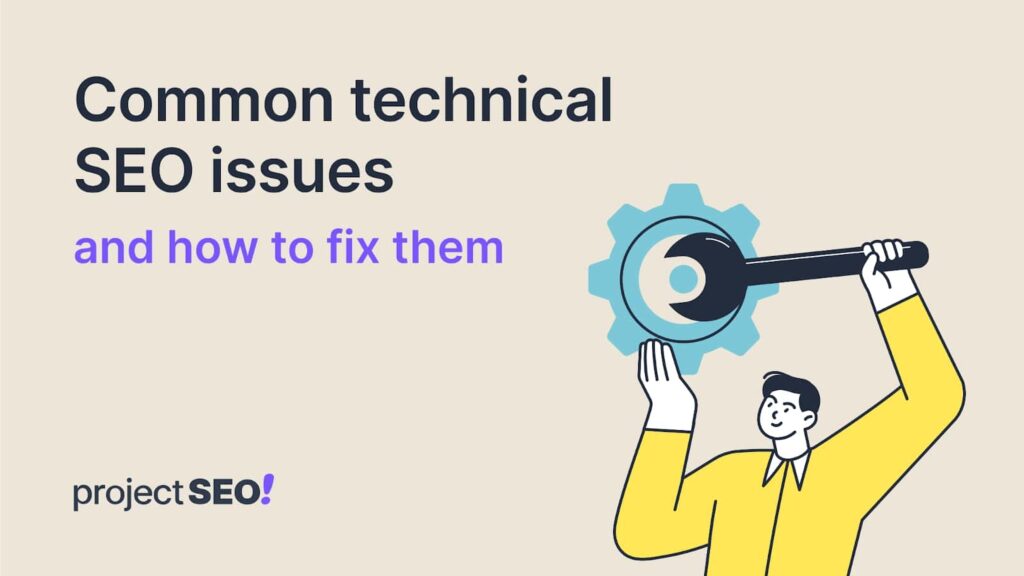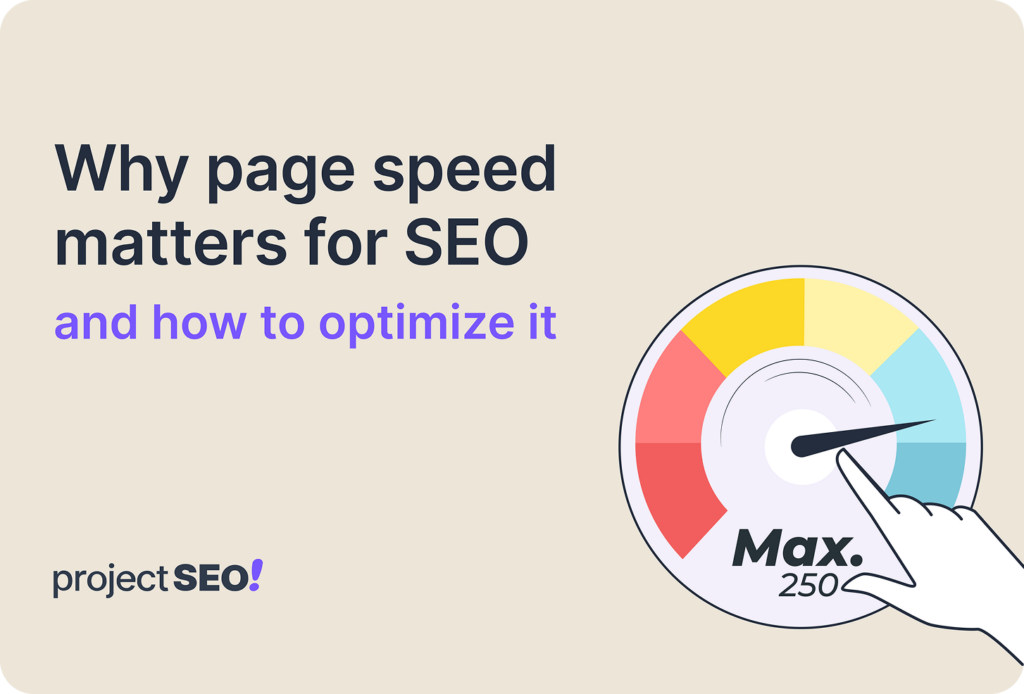Marketing strategies are crucial to success in B2B. They help you reach the right clients, build strong relationships, and grow your business. However, creating a solid B2B marketing strategy can be challenging. It takes a lot of know-how and experience to get it right, so having the right expertise on your side is essential.
- What is a B2B Marketing Strategy?
- Importance of Building Relationships Between Businesses
- What are the key things to focus on in B2B marketing?
- Why You Should Prioritize B2B Marketing Strategy?
- How does a B2B marketing strategy lead to a better ROI?
- How does a B2B marketing strategy help align your marketing with your business goals?
- B2B vs B2C Marketing
- Best Marketing Strategies for B2B
- Develop Your First B2B Marketing Strategy Today
What is a B2B Marketing Strategy?
What exactly is B2B marketing?
B2B marketing, short for business-to-business marketing, is when businesses promote their products or services to other companies instead of directly to consumers. It’s focused on creating strong relationships and offering solutions that help different companies succeed.
Why do businesses use B2B marketing strategies, and what are they trying to achieve?
The main goal of B2B marketing is to build and maintain relationships with other businesses that lead to successful transactions for both sides. Here’s what B2B marketing aims to do:
- Generate Qualified Leads: Find and attract businesses that could benefit from your products or services.
- Build Brand Awareness: Make your brand well-known in your industry so more businesses recognize and trust you.
- Educate the Market: Share relevant content and valuable information that helps potential customers understand their challenges and how your products can solve them.
- Nurture Relationships: Keep in touch with current and potential buyers to build trust and ensure they feel valued.
- Drive Sales: Converting leads into sales by guiding them through the buying process and addressing their needs.
- Maximizing Customer Retention: Ensuring customer satisfaction and loyalty to encourage repeat business and long-term partnerships.
Importance of Building Relationships Between Businesses
Building strong relationships is central to B2B marketing because the decision-making process in B2B transactions often involves multiple stakeholders and takes longer than in B2C (Business-to-Consumer) marketing. A successful B2B relationship is based on trust, reliability, and a deep understanding of the other business’s needs. These relationships are crucial because they lead to:
- Repeat Business: Satisfied clients are likelier to continue doing business with you.
- Referral Marketing: Happy clients can refer your business to other potential clients, expanding your network.
- Customer Loyalty: Strong relationships increase customer loyalty, making them less likely to switch to competitors.
What are the key things to focus on in B2B marketing?
There are a few essential elements to keep in mind:
- Targeting Decision-Makers: It’s crucial to reach the company’s people with the authority to make buying decisions, like executives or managers.
- Long Sales Cycles: B2B sales often take longer because the products or services can be complex, and several people might need to approve the purchase. So, patience and consistent follow-up are essential.
- Higher Value Transactions: B2B deals usually involve significant amounts of money because businesses might buy in bulk or need customized solutions. Your marketing should emphasize your products or services’ value and return on investment.
These elements highlight why a thoughtful, relationship-focused approach is essential for success in B2B marketing.
Why You Should Prioritize B2B Marketing Strategy?
Focusing on a B2B marketing strategy can pay off for your business. A focused B2B marketing strategy brings a lot of advantages:
- Targeted Efforts: You can zero in on the right businesses and decision-makers, making your marketing more effective and less wasteful.
- Better Quality Leads: By focusing your efforts, you attract leads who are more likely to become loyal customers.
- Stronger Brand Presence: Consistent and targeted marketing helps build your brand’s reputation, making you a trusted name in your industry.
How does a B2B marketing strategy lead to a better ROI?
A focused strategy is all about getting the most bang for your buck:
- Savvy Spending: By targeting the right businesses, you use your marketing budget more wisely, getting better results without overspending.
- Higher Conversions: With better-quality leads, you’re more likely to turn prospective buyers into paying customers, boosting your ROI.
- Growth Potential: A strong strategy can grow with your business, ensuring long-term ROI.
How does a B2B marketing strategy help align your marketing with your business goals?
A focused B2B marketing strategy ensures that your marketing supports your overall business goals:
- Drives Revenue Growth: Your marketing efforts directly contribute to your revenue targets by targeting the right customers.
- Builds Market Leadership: Consistent, strategic marketing helps you achieve your long-term goals, like becoming a market leader.
- Enhances Teamwork: When marketing is aligned with business goals, it improves collaboration across different teams, such as sales and marketing.
Prioritizing a B2B marketing strategy isn’t just about getting more clients; it’s about building solid and profitable relationships that help your business grow.
B2B vs B2C Marketing
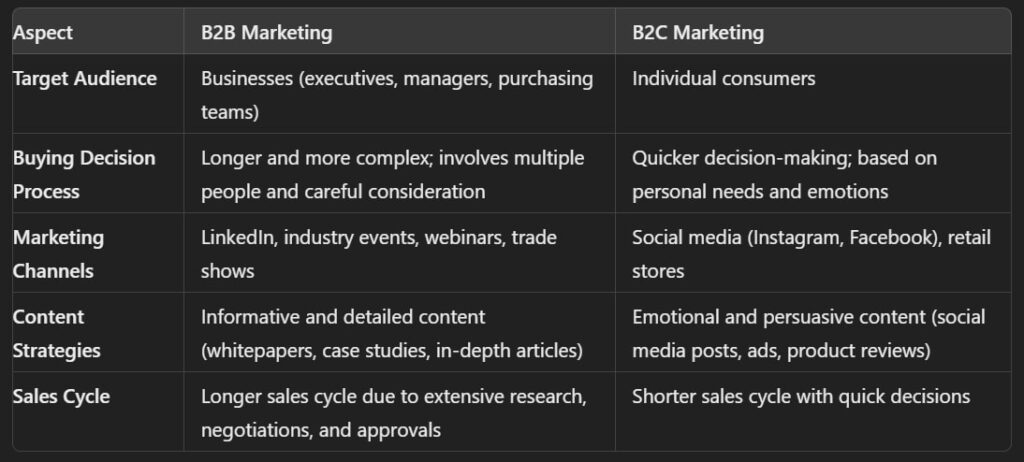
The most significant difference is who you’re targeting. B2B marketing is about selling products or services to other businesses, while B2C marketing focuses on individual consumers.
The difference in the target audiences is who they are trying to reach in B2B vs. B2C marketing.
- B2B Marketing: You’re targeting businesses, so you’ll deal with decision-makers like executives, managers, or purchasing teams.
- B2C Marketing: The focus is on individual consumers, so your messaging is more about what appeals to them personally.
What Are the Differences in These Two Marketing Strategies?
There are a few key differences between B2B and B2C strategies apart from the target audience:
Buying Decision Process
The buying process is quite different:
- B2B Marketing: The decision-making process is longer and more complex because it often involves multiple people and requires careful consideration. Business decision-makers take more time.
- B2C Marketing: Individual consumers usually make decisions quickly based on their needs and emotions.
Marketing Channels
Marketing efforts are directed to reach the target audience through different channels:
- B2B Marketing: You’ll often use LinkedIn, industry events, webinars, and trade shows to connect with business professionals.
- B2C Marketing: Social media channels like Instagram, Facebook, and retail stores are more effective for reaching individual consumers.
Content Strategies
The type of content you create also varies:
- B2B Marketing: Content marketing for B2B is more informative and detailed, such as whitepapers, case studies, and in-depth articles that help businesses make intelligent decisions.
- B2C Marketing: This content marketing strategy is more emotional and persuasive. It aims to connect with consumers with personalized content, including social media posts, ads, and product reviews.
Sales Cycle Differences
The length of the sales cycle is another crucial difference:
- B2B Marketing: The sales cycle is longer because it involves more research, negotiations, and approvals.
- B2C Marketing: The sales cycle is shorter, as consumers often make quick decisions without extensive consultation.
These differences highlight why B2B and B2C marketing efforts require different approaches to be successful.
Best Marketing Strategies for B2B
Content Marketing
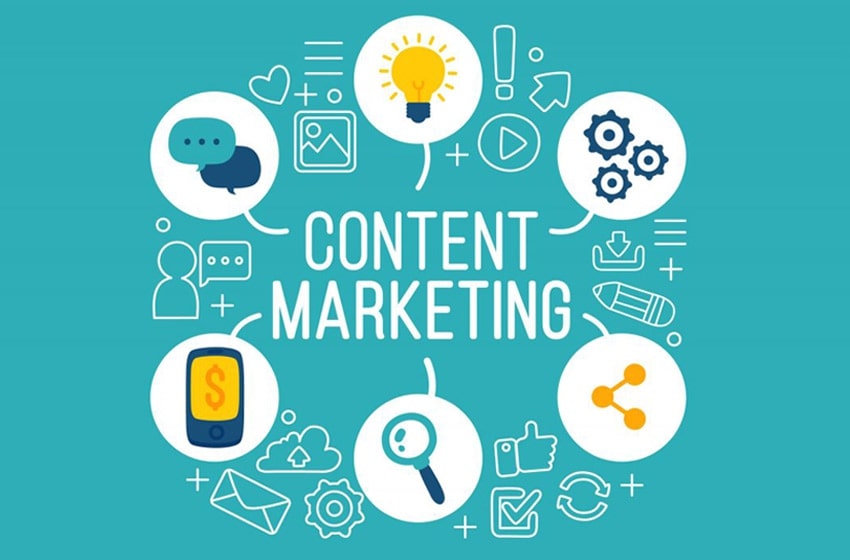
Content marketing remains a cornerstone of B2B marketing because it establishes your business as a thought leader and builds trust with your audience. In the B2B space, buyers are often looking for detailed, reliable information to make informed decisions. High-quality content helps to educate your audience, showcase your expertise, and provide solutions to their pain points.
Strategic Approaches to B2B Content Marketing
1. Setting Clear Goals: Before creating content, it’s crucial to establish clear, measurable goals. These could include increasing brand awareness, generating leads, or nurturing existing relationships. Understanding what you want to achieve helps guide your content strategy and ensures that each piece of content serves a specific purpose.
2. Audience Research: Understanding your target audience is essential. Conduct thorough research to identify your audience’s needs, challenges, and preferences. This knowledge allows you to create content that resonates with them and addresses their specific concerns, making your content more effective.
3. Competitor Analysis: Analyze your competitors’ content marketing strategies. Identify their strengths and weaknesses and find gaps in their strategies that you can exploit. This could mean covering topics they haven’t touched on or providing more in-depth insights.
4. Content Distribution: Simply creating content isn’t enough; you need to ensure it reaches the right people. Use a multi-channel approach to distribute your content, including your website, social media platforms, email newsletters, and industry-specific sites. Leveraging SEO can help your content rank higher in search engines, increasing its visibility.
5. Measuring Success: Track the performance of your content using metrics like engagement rates, lead generation, and conversions. Regular analysis will help you understand what works and what doesn’t, allowing you to adjust your strategy accordingly.
What types of content should you focus on?
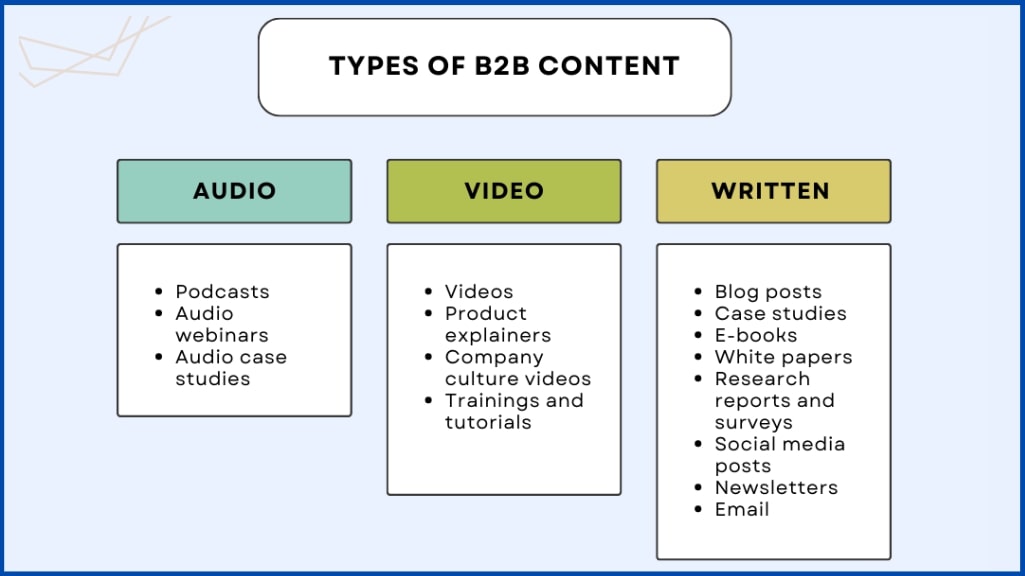
Some of the most effective content types include:
Whitepapers: Detailed reports on specific topics.
Case Studies: Success stories that show how your product or service has helped other businesses.
Blogs: Regular articles informing your audience about industry trends and solutions.
Webinars: Interactive sessions where you can share knowledge and connect with potential buyers.
How do you get your content in front of the right people?
Distribute your content through your website, social media marketing, email marketing, and industry-specific platforms. Search engine optimization can help your content rank higher in search engines, bringing in more visitors.
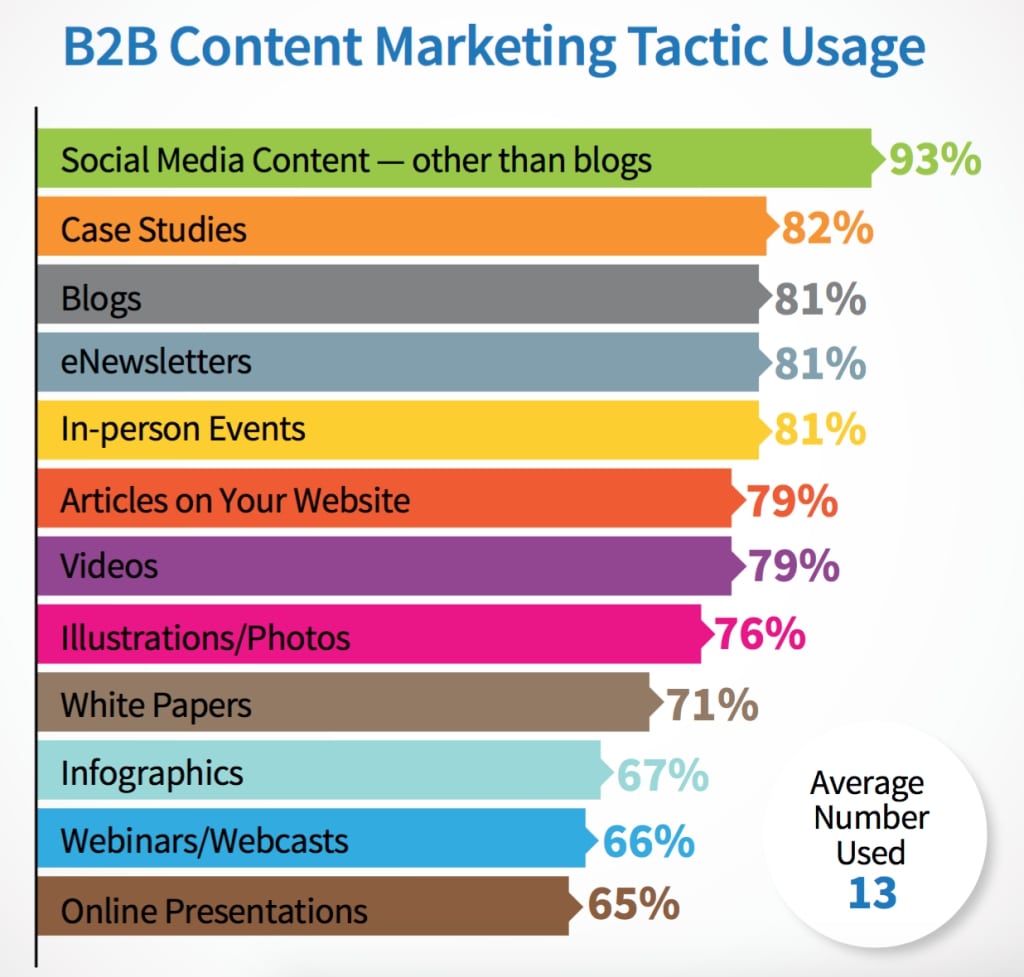
SEO and SEM
Why are SEO and SEM important in B2B marketing?
SEO (Search Engine Optimization) and SEM (Search Engine Marketing) are essential because they boost your visibility in search engines, making it easier for potential buyers to find you.
Implementing SEO and SEM Strategies in B2B Marketing
Here are a few key strategies:
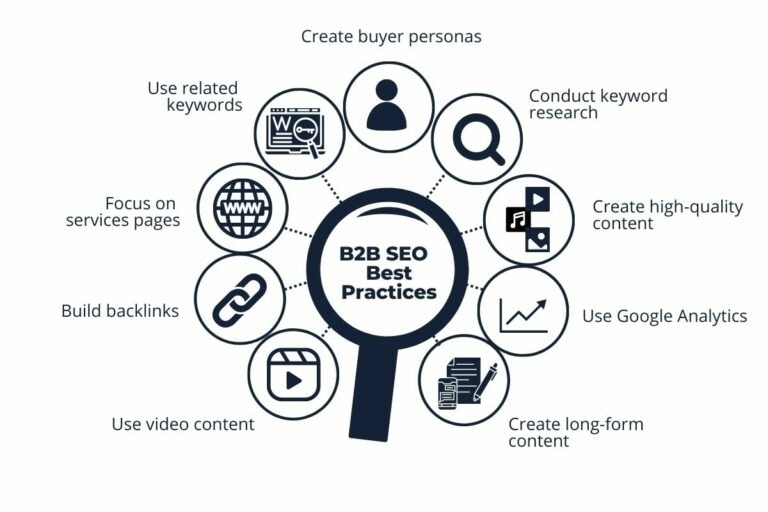
1. SEO and SEM Integration: Integrating SEO and SEM into your content marketing strategy is vital for increasing your online visibility. SEO focuses on optimizing your content and website to rank organically, while SEM can boost your presence through paid advertising.
2. Keyword Research: Conducting keyword research helps you understand what terms your audience is searching for. Use these insights to optimize your content, ensuring it meets potential buyers’ search intent.
3. On-Page and Off-Page SEO: On-page SEO involves optimizing your website’s content, meta tags, and structure, while off-page SEO includes building backlinks from reputable sources. Both are essential for improving your search engine rankings.
4. Pay-Per-Click (PPC) Campaigns: PPC campaigns, part of SEM, allow you to target specific keywords and demographics, driving highly targeted traffic to your site. These ads appear at the top of search results, increasing your visibility and the likelihood of conversions.
How does better search visibility benefit your business?
When you rank higher in search results, more people find your business, leading to more website visitors, better-quality leads, and, ultimately, more sales.
Email Marketing
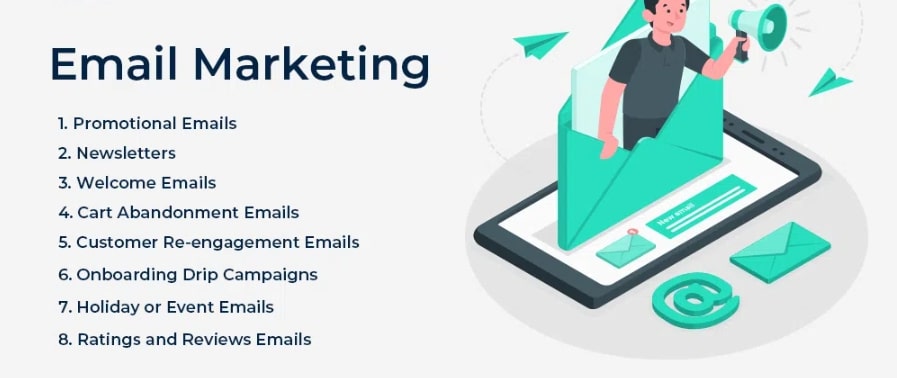
How can email marketing help B2B businesses?
Email marketing is great for nurturing leads. It keeps your business at the top of your mind and guides prospects through the buying process.
What are some effective email marketing tactics?
1. Segmentation and Personalization: Segment your email lists based on factors like industry, job role, or previous interactions with your business. This allows you to send personalized messages that are more relevant to each recipient, increasing engagement and conversion rates.
2. Automated Drip Campaigns: Use automated drip campaigns to nurture leads over time. These campaigns can guide prospects through the sales funnel with tailored content, helping them move closer to making a purchase.
3. Newsletters: Regularly share industry news, tips, and valuable content with your audience.
4. Measure Email Performance: Track metrics such as open rates, click-through rates, and conversions to gauge the effectiveness of your email campaigns. Use this data to refine your strategy and improve future campaigns.
Social Media Marketing
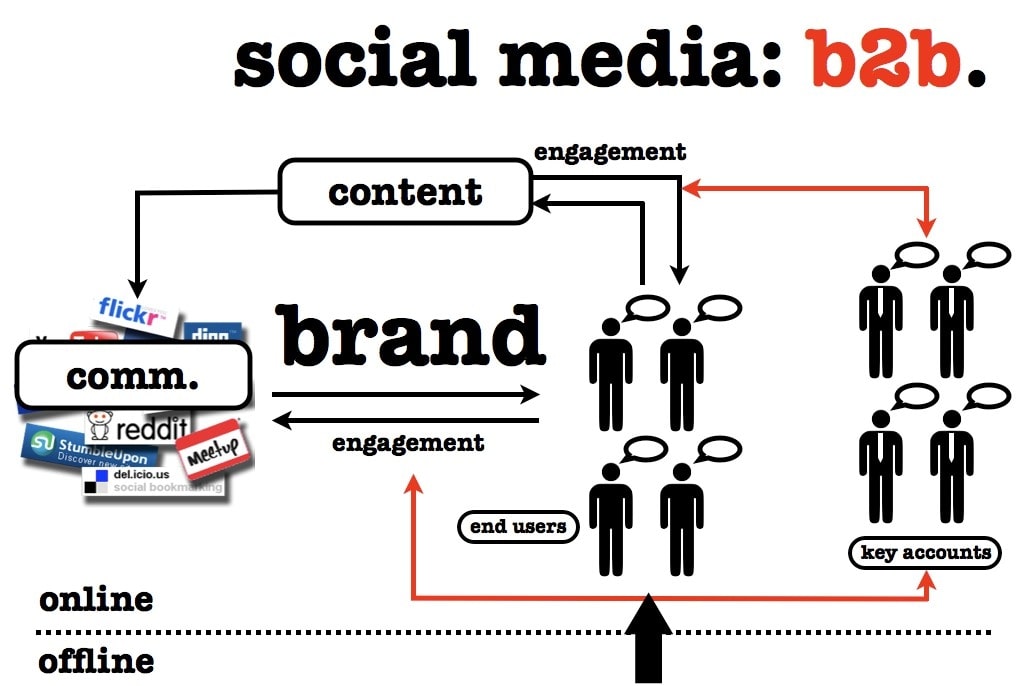
What are some excellent social media strategies for B2B?
1. Strategic Platform Use: Focus on platforms like LinkedIn and Twitter, where professionals and industry leaders are most active. These platforms are ideal for sharing thought leadership content and engaging with your target audience.
2. Content Sharing and Engagement: Regularly share insightful content and participate in industry discussions to build relationships and establish your brand as an authority in your field. Engagement is key to maintaining a strong social media presence.
3. Social Media Advertising: Use targeted ads on platforms like LinkedIn to reach decision-makers and generate leads. Ads that address your audience’s specific pain points are more likely to resonate and convert.
Niche focused perspective
What’s a niche-focused strategy in B2B marketing?
A niche-focused strategy means targeting a specific market segment instead of trying to reach everyone. This approach lets you tailor your offerings and messaging to meet the unique needs of that group.
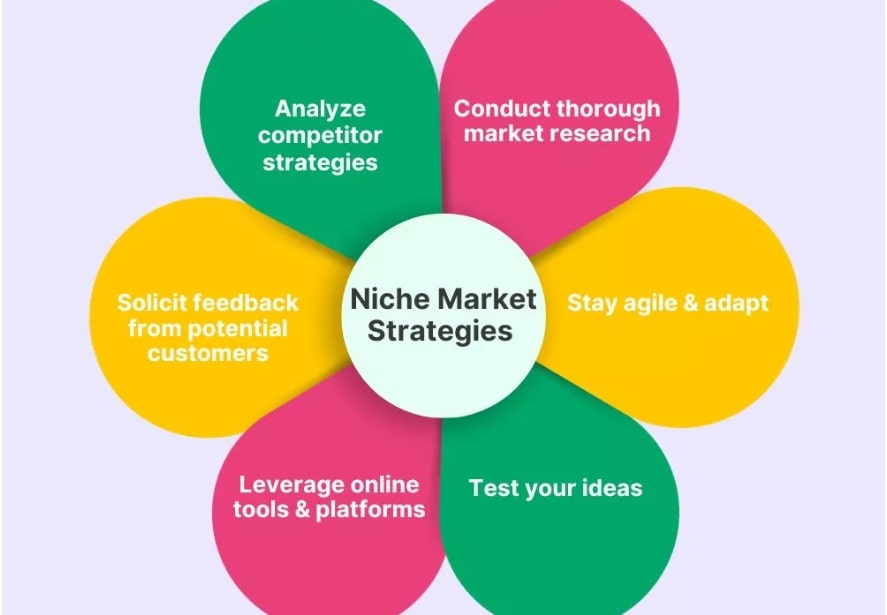
Niche-Focused B2B Marketing Strategies
1. Defining Your Niche: Identify and focus on a specific market segment that aligns with your expertise. Your marketing efforts must address your niche’s unique needs and challenges.
2. Conduct Market Research: Research your market through surveys, focus groups, or even one-on-one interviews to understand your potential customers, their needs, challenges, and preferences. This helps you create more relevant and effective marketing strategies.
3. Analyze Competitor Strategies: Study your competitors’ strategies within the niche. Identify their strengths and weaknesses to find gaps that you can fill with your unique offerings.
4. Create Specialized Content: Develop content that speaks directly to the concerns and interests of your niche audience. This could include industry-specific insights, case studies, or solutions tailored to their needs.
5. Seek Feedback from Potential Customers: Engage with potential customers in your niche to gather feedback on what they want. This helps you refine your offerings to meet their expectations.
6. Leverage Online Platforms and Tools: Use tools like Google and social media to identify your niche market. Search for keywords and explore forums or groups where your industry is discussed to learn about your potential customers’ interests, needs, and challenges.
7. Test Your Ideas: After finding a potential niche, test your ideas and experiment with different marketing strategies before committing fully. You can also offer a limited version of your product to see how customers respond. Use their feedback to make improvements and fine-tune your offerings.
Why is focusing on a niche so important?
Focusing on a niche can strengthen brand loyalty, increase conversion rates, and reduce competition, helping you become a go-to expert.
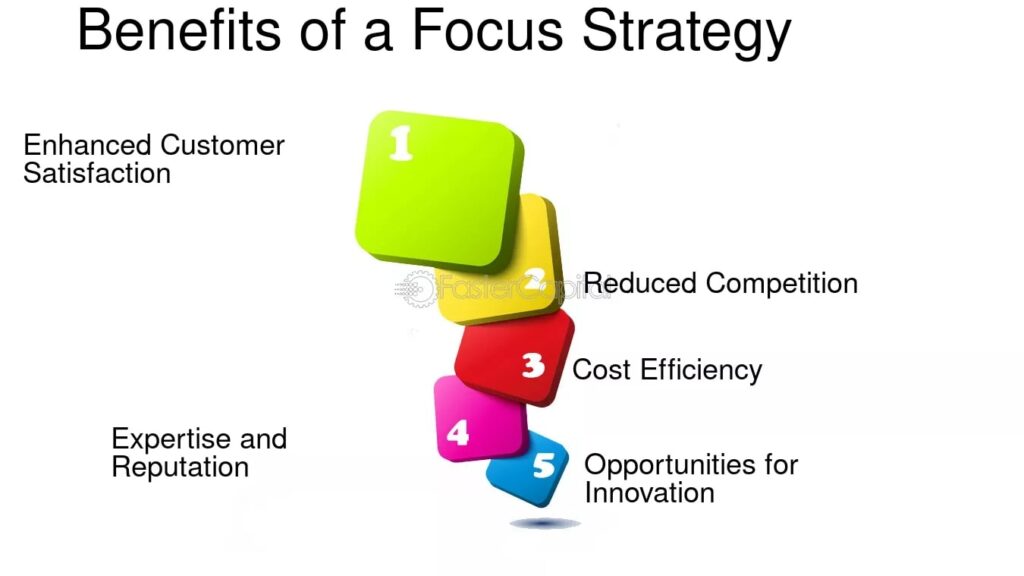
Referral Marketing
Why is referral marketing important in B2B?
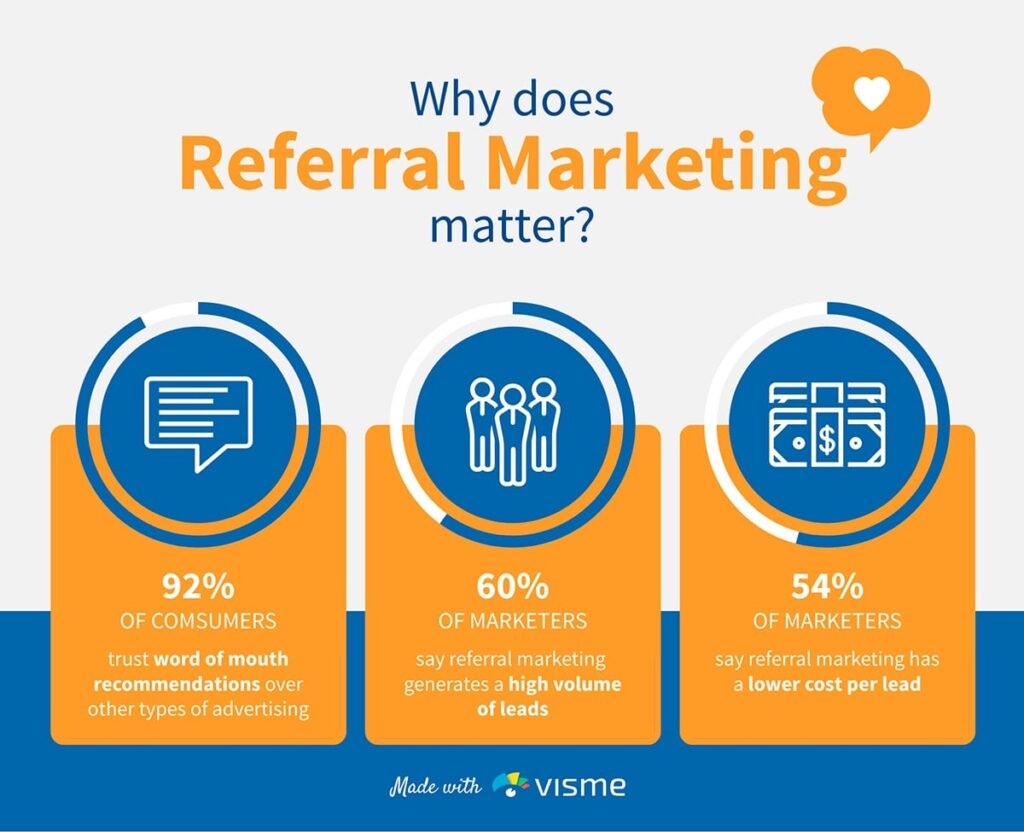
Referral marketing is powerful because it leverages the trust and satisfaction of existing customers to bring in new business.
What’s the goal of a referral marketing strategy?
The main goals are to generate new leads, boost your brand’s credibility, and build a network of loyal customers who recommend your business to others.
How can referral marketing impact your business?
Thanks to the trust built through personal recommendations, it can significantly boost growth by attracting high-quality leads that are more likely to convert.
Data Analysing and Testing
Why is data analysis and testing important in B2B marketing?
There is no one-size-fits-all approach to marketing, so it’s crucial to experiment and see what works. Analyzing data helps you understand what’s effective and what needs improvement.
How does A/B testing help?
A/B testing lets you compare different versions of your content, emails, ads, or landing pages to see which performs better. Analyzing the results, you can make smarter decisions that improve your marketing efforts.
Why is this so valuable?
Experimenting and analyzing data can lead to significant insights and improvements, helping you discover tactics to enhance your results significantly.
Develop Your First B2B Marketing Strategy Today
Ready to grow your business? It’s time to start building your B2B marketing strategies! At ProjectSEO, we’re here to help you create strategies that work. We’ll help you reach the right audience, increase your brand’s visibility, and achieve your goals.
Let’s work together – contact us today to get started!
